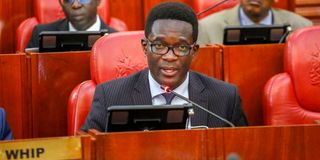Ezra Chiloba: CA lacks teeth to rein in ‘cultic’ religious content on TV

Communication Authority of Kenya Director-General Ezra Chiloba before the Senate Ad-hoc Committee investigating the Shakahola deaths at Parliament Buildings on June 19, 2023.
Communications Authority of Kenya’s (CA) hands are tied in dealing with controversial religious content aired on television or social media, a Senate committee heard on Monday.
Appearing before the Senate Ad-hoc Committee investigating Shakahola deaths, CA Director-General Ezra Chiloba said the authority has no regulatory mandate to pull down any controversial content from social media platforms.
He noted that although Kenya has its own legal provisions for enforcing compliance, it is difficult to enforce the same to deal with inappropriate content on social media.
This, he said, is because the owners of such platforms are non-citizens and the laws applicable in Kenya are not applicable in other jurisdictions.
The CA boss was appearing before the Tana River Senator Danson Mungatana-led committee to shed light on why the agency failed to pull down cultic religious content aired by religious TV stations.
Mr Chiloba told the senators that monitoring of broadcast content is limited by the geographical reach and capacity of the CA to log.
He noted that of the 109 religious TV stations in the country, only one is off-air and it is difficult to pull down any content that is deemed inappropriate.
Social media platforms
He said social media platforms are owned by foreigners and are not bound by Kenyan laws, calling for the need for a stronger regulatory framework to fix such legal and other regulatory gaps.
“The law does not give us the regulatory mandate to pull down content, especially in social media,” said Mr Chiloba. “We have issues with the misuse of social media. Our role is to monitor what poses a threat to Kenyans.”
He said that in the CA programming code, occultism is defined as a belief in the efficacy of various practices based on hidden knowledge about the universe and its mysterious forces.
According to the CA boss, there are serious socio-economic problems bedevilling the society that must be addressed alongside religious cultism.
Consequently, in order to avoid glamourising occultism and to avoid its undesirable consequences, the guidelines require that programmes featuring superstitions and pseudo-scientific beliefs and practices, faith healings or similar subjects be carefully presented so as not to mislead the viewer or listener, he said.
“According to the authority’s programming code, materials that promote or encourage occult practices, black or white magic, witchcraft and similar activities are not admissible during the watershed period,” he said.
Mr Chiloba further revealed that religious organisations providing Free-to-Air television or radio services are required to adhere to the licence conditions and the programming code pursuant to Section 46 of the Kenya Information and Communications Act.
The regulation provides that religious programmes shall not be used to maliciously attack, insult, harass or ridicule other churches, faiths, sects or denominations or their followers because of their beliefs but give due regard to the freedom of religious expression.
Mobile lines
In addition, the CA boss asked the committee to allow it more time to respond to the issues of communications and mobile lines associated with the controversial preacher Paul Mackenzie.
Mr Chiloba revealed that records in their possession show that Mackenzie registered four Safaricom lines and two Telkom lines, adding that of the two Telkom lines, one is an inactive merchant account with no link to any bank account.
He, however, clarified Mackenzie’s teachings were not on air on Times TV and that the stations aired content of Pastor Ezekiel Odero who is the proprietor of World Evangelism TV.
He said that Times TV was hosted by the Pan African Network Group (PANG) broadcasting signal distributor and was broadcasting in Mombasa and Malindi sites.
According to Mr Chiloba, Newlife Communications Limited Director Pastor Ezekiel Odero was initially supposed to take over Times TV but was later issued a license and opened his station.
Meanwhile, the Hindu Council of Kenya opposed calls by Attorney General Justin Muturi to amend the Societies Act to curb the spread of deadly cults in the country.
Appearing before the committee, the Council’s deputy national secretary-general Nilesh Bhavsar said the current law is adequate and only needs full implementation.
“We do not need to change the law. We just need to strengthen implementation. Legislation is just a guiding pole, its implementation is key,” said Mr Bhavsar.
On June 10, the National Council of Churches of Kenya also rejected AG Muturi's bid to amend the Societies Act.





